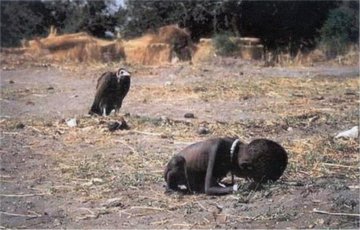
"What according to you makes a great photograph?"
Someone asked me this question last week. Couple of years back I had this very question in my mind. You know, these days Google has eliminated the need for using our brain. The next thing I did was typing "greatest photograph" in Google.
If you google for "greatest photographs" you will see several lists popping out - "Top 10 greatest photographs", "greatest, most iconic photos ever taken" etc. There are several images that get repeated in these "top N" lists compiled by different people in different parts of the world. Most of all those images portray war atrocities, human sufferings, racial discrimination, misery, poverty etc. Basically, very gloomy at best. I do agree that some of these images served a great social cause. However, aren't there any other photographs which qualify to get slots in these lists too? How many photographs in those lists have people smiling? How many of those top N lists contain other subjects in mother nature? Only images which portray human misery qualifies to be greatest photographs?
Why is this?
I think Darwin had answered this - survival. Subjects and themes around survival of (only) human species and human centric morality takes the precedence over everything that gets photographed. I am not very sure whether it is inevitable. I tend to disagree however. Recently I heard an interesting phrase, "ethical killing"! This is in the context of an increased population of some wildlife species. When we talk about "ethical killing" I am not sure who's ethics we are talking about. Is it of that wildlife species that is getting "ethically" killed by us or our own "ethics" which the helpless wildlife is completely unaware of? This reminds me of an interesting quote by Bertrand Russell.
"Organic life, we are told, has developed gradually from the protozoan to the philosopher, and this development, we are assured, is indubitably an advance. Unfortunately it is the philosopher, not the protozoon, who gives us this assurance."
Below are the words of Henry Cartier Bresson about Ansel Adams and Edward Weston, probably around World War II.
"The world is going to pieces and people like Adams and [Edward] Weston are photographing rocks!"

If we switch the subjects in Kevin Carter's above image, "Famine in Sudan", assuming in the image the vulture is dying and a person looking at it, would it have won the Pulitzer prize? At best, it would have become yet another "conservation photograph" for the vultures and forgotten the next day.
Only in the world of bees this below image may be considered memorable. In our world, at best it is a "beautiful natural history moment"!

However, this below image of langur holding its dead baby is not as "beautiful" as the above bee image. This seem to hurt. Why? Unlike bees langurs are closer to us and the forms and postures are anthropomorphic. We may be unconsciously placing ourselves in its situation and feeling sad about it? Why does the image of the bee above appears like a mere natural history moment?

Here are a couple of images which are considered greatest and are found several Top N lists. The below image by Jeff Widener has been considered as one of the most iconic image of the 20th centuary.

Here is another Pulitzer award winning image and is also found in many lists is by Nick Ut.

This page contains Pulitzer Prize winning images for "Feature Photography" for past 5 decades. It is very clear what we consider greatest or iconic images, in general. Is that inevitable? How much we love ourselves, beyond everything else in this mother nature!
"I still believe there is a real social significance in a rock - a more important significance therein than in a line of unemployed."
was Ansel Adam's reaction to Henry Cartier Bresson's criticism. I agree that there are subjects which have happy/tranquil/beautiful notes them, yet they may deeply mean something to the photographer, more deeply than those which portray misery. As a nature photographer, I see some hope in these profound and beautiful lines by Albert Einstein:
"The most beautiful thing we can experience is the mysterious. It is the source of all true art and science. He to whom the emotion is a stranger, who can no longer pause to wonder and stand wrapped in awe, is as good as dead - his eyes are closed. The insight into the mystery of life, coupled though it be with fear, has also given rise to religion. To know what is impenetrable to us really exists, manifesting itself as the highest wisdom and the most radiant beauty, which our dull faculties can comprehend only in their most primitive forms - this knowledge, this feeling is at the center of true religiousness. - Albert Einstein."
While a photograph may not answer those mysteries, ever, I think it may help portray mysteries as mysteries, beyond just miseries.
Back to the question I started this with,
"What according to you makes a great photograph?"

Still thinking..
[All the images which are not mine are hot linked from the respective Wiki pages which are in public domain]